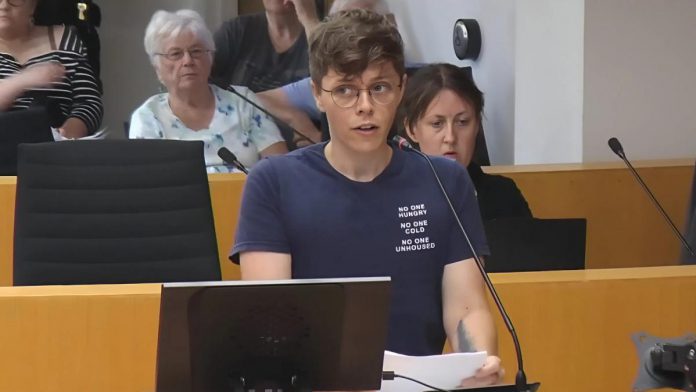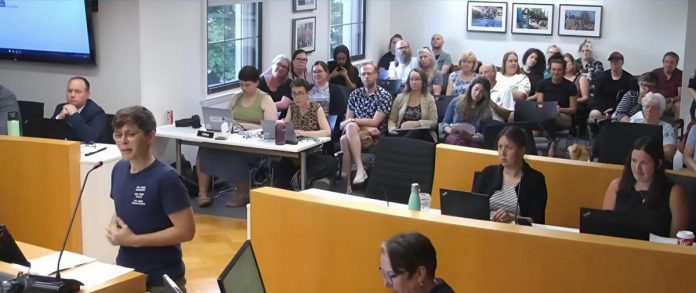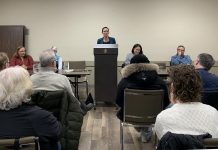
There was a lot of talk of compassion and empathy by some members of Peterborough city council on Wednesday night (July 2) before they voted down a motion by councillor Keith Riel to continue funding expanded services at Trinity Centre in 2026 for people experiencing homelessness.
In a 6-5 vote, Mayor Jeff Leal and councillors Don Vassiliadis, Dave Haacke, Andrew Beamer, Lesley Parnell, and Kevin Duguay voted against the motion, with councillors Riel, Joy Lachica, Alex Bierk, Matt Crowley, and Gary Baldwin voting in favour.
Wednesday night’s marathon five-hour council meeting, which had been rescheduled from Monday evening due to power issues at city hall, was dominated by public delegations and a discussion on council’s decision at its general committee meeting last Monday (June 23) not to allocate $269,280 to One City Peterborough to enhance the overnight drop-in program at Trinity Centre and not to allocate $244,800 to expand the operating hours of the daytime program at Trinity Centre.
At the general committee meeting, councillors had also voted unanimously in favour of a $250,000 increase to the city’s Housing Stability Fund and $285,600 to expand Brock Mission’s capacity. The four funding recommendations were part of a staff report on homelessness winter shelter options from community services commissioner Sheldon Laidman, in response to a council request from February for such a report.
Laidman’s report recommended that council commit $1.05 million of the city’s 2026 operating budget to maintain existing homelessness services that were funded through $1.2 million from social services reserves in 2025. The 2025 funding included $264,000 to allow the Trinity overnight drop-in program to operate through summer 2025 and $240,000 to expand the operating hours of the Trinity daytime program in 2025.
It also included a $360,000 increase to the Housing Stability Fund to expand access to prevention and diversion supports for residents at risk of homelessness and to provide financial supports for people moving from homelessness into housing, as well as $280,000 to expand Brock Mission’s 24/7 capacity from 32 to 40 beds, helping to reduce pressure on the emergency shelter system.
The report recommended that council approve the continuation of similar levels of funding in 2026, but through the city’s 2026 operating budget rather than through social services reserves, which would result in an increase of 0.46 per cent to the 2026 property tax rate.
“Failure to invest the $1,050,000 million for 2026 will significantly compromise the City’s ability to respond to homelessness,” the report states, noting that an additional 53 people will be unsheltered as they would be without access to overnight indoor space throughout the year and that 300 homeless or low-income people who rely on the city’s only daytime drop-in program will lose access to a consistent and accessible indoor location.
“Without these supports, pressures on emergency services, hospital emergency departments, and encampment management will likely increase, straining other parts of the municipal system and reducing the overall effectiveness of the homelessness response,” the report states.
Since council already voted against the two funding recommendations for Trinity Centre at the June 23 general committee meeting, the motion that was presented at Wednesday night’s council meeting only included the two recommendations for funding the Housing Stability Fund and Brock Mission.
With councillors Haacke, Bierk, Beamer, and Parnell attending the meeting remotely, council first heard from 10 public delegations on the issue over a period of two hours. Most of the delegations spoke in support of continuing to provide funding to One City Peterborough for expanded services at Trinity Centre — most notably Peterborough Community Health Centre executive director Ashley Safar and Haliburton Kawartha Northumberland Peterborough Public Health medical officer of health Dr. Thomas Piggott.
However, the very first delegation on this issue was Auden Palmer, director of outreach services at One City Peterborough, who addressed council and answered questions for over a half an hour.
Palmer noted that Trinity Centre’s overnight program represents 46 per cent of adult emergency shelter spaces in the city and runs at 103 per cent capacity, with the drop-in program serving hundreds of people every day.
“When these services disappear, the people using them don’t,” Palmer said. “They move into parks, doorways, alleys, and emergency rooms. These aren’t abstract outcomes; we have seen them before, and we will see them again.”
Palmer also addressed concerns raised by some councillors at the general committee meeting about One City’s provision of services.
“We are fully meeting the obligations of our contract,” Palmer said, adding that One City has expanded beyond what the city funds them to do with the support of grants, donors, and community partners. “We have consistently exceeded our contractual reporting requirements, providing the city with detailed financial statements, service statistics, and incident data.”
“Trinity is not without rules. We have a clearly defined and consistently enforced code of conduct. Service restrictions are recorded and shared with the city. Staff are trained in prevention, de-escalation, and conflict resolution.”
“Low barrier does not mean no expectations or standards. It means not imposing unnecessary conditions that exclude the very people these services are meant to reach. We acknowledge the impact our presence has had in the neighbourhood, but the idea that Trinity is out of control doesn’t match the reality on the ground.”
Noting that trained staff are always on site managing issues as they arise, Palmer added that the extended hours of the daytime program were designed to reduce “external impact” by offering space inside to people who would otherwise have nowhere to go.
After stating that One City does not believe emergency relief programs are the solution to homelessness but are “an essential part of the housing continuum,” Palmer said they offer “safety, trust, and connection, making it possible to move towards stability and housing.”
Palmer added that the Trinity Centre has supported people in accessing employment programs, transitional and supportive housing, referrals to treatment, and reconnection to family.
“We are ready to keep doing our part, and we hope to see that same commitment reflected in your decision,” Palmer told council.

In response to a question from councillor Riel, Palmer provided an overview of how Trinity Centre operates.
The drop-in day program runs from 9 a.m. to 7 p.m., offering a space for people to come inside and rest, use the washroom, take a shower, and get a meal. Palmer noted that usually around 200 people use the program each day, and the meal program does not receive city funding but is sustained through donations and partnerships.
Multiple service providers are in the space, including a community paramedic who offers wound care and referrals for more complex healthcare issues, doctors once a week to provide medical support, addiction and harm reduction service providers, housing support service providers, and employment service providers.
At 7 p.m., the doors close so that staff can set up for the overnight program which runs from 8 p.m. to 8 a.m. and can support up to 45 people on a first come, first served basis. People line up and the program is usually full by 8:15 p.m., at which point the doors are closed. Up to three people are allowed to be on a wait list and remain on the property in case a space opens up, as often people will leave during the night to give someone else a space, which is why the service’s capacity is higher than 100 per cent.
At 8 a.m., people are asked to leave the space so staff can set up for the drop-in day program at 9 a.m. Palmer noted that three staff are on the floor at any time during both the day and overnight programs, as part of the contractual arrangement with the city.
After councillor Riel asked what Trinity Centre is doing about community concerns about it being “messy outside” and the number of people “milling around” outside, Palmer said the extended daytime program hours have helped with the issue, adding that Trinity Centre has also increased its staff presence on the grounds and “higher limitations” on personal belongings.
Palmer pointed out that Trinity Centre, because it is not a traditional shelter, has no space to store personal belongings. People must carry their personal belongings with them when they are accessing or leaving the daytime or overnight program, which can “look messy, it can look dishevelled, it can look like garbage.”
“It would be inhumane not to ask people to not have personal belongings,” Palmer added, noting lack of storage for personal belongings is also a concern for clients of the services.
Palmer also answered questions from councillors Lachica, Bierk, Baldwin, and Crowley.
In response to a question from councillor Bierk about what One City is doing to address community concerns, Palmer said One City has implemented a new staffing model for more oversight and supervision for better integration and communication between the daytime and overnight programs, revised its code of conduct, placed more limitations on personal belongings, increased staff presence outside on the property, and hold bi-monthly clean-up days.
Councillor Bierk also asked Palmer about the impact of potential funding cuts on One City. Palmer said that funding stability helps retain staff, which is also important for continuity of service for clients, and also helps with planning even though these are temporary emergency programs.
After Palmer’s delegation, council heard from Jessica Correa and Danielle Turpin, who both spoke in support of One City. Correa noted that issues with One City could be addressed by improving oversight and providing conditional funding with milestones, and Turpin pointed out that not funding One City will disproportionately affect marginalized groups such as Indigenous and trans people, which could be an issue with the Charter of Rights and Freedoms.
“I just do not understand where they think the people are going to go if we remove this funding,” Turpin said, referring to people who are concerned with community safety and other issues that are associated with homelessness. “This is going to increase the problem. It’s not going to make this go away. Whether we like it or not, we will not make this go away by decreasing the funding to support these individuals and support the organizations who are supporting these individuals. It will get worse.”
After hearing from Jennifer Lacey, who provided her perspective after having worked as a frontline child welfare worker, council heard from Peterborough Community Health Centre executive director Ashley Safar.
Safar said that Trinity Centre provides services that are part of “essential infrastructure” that prevents suffering, saves lives, and prevents costs in other parts of the system. She said it was “disheartening” for the city to imply that funding services for Indigenous people should be the responsibility of the federal government, as they are also members of the community.
Safar pointed out that, when people lose access to low-barrier services like those provided by Trinity Centre, costs to the system increase, including in healthcare, by-law enforcement, and policing. She said that low-barrier services is “most effective and more compassionate than constant crisis response.”
“This decision will not make homelessness disappear. It will only make it more visible, more desperate, and more costly in other systems,” Safar said.
In his delegation, Dr. Thomas Piggott, medical officer of health with Haliburton Kawartha Northumberland Peterborough Public Health, outlined the health impacts if the “critical service” at One City is cancelled or decreased.
“This is literally and issue of life and limb,” Dr. Piggott said, before sharing statistics on the number of deaths of unhoused people in Peterborough from the provincial coroner.
He said that the number of deaths have doubled in 2023-24, with at least 47 unhoused people dying between 2021 and 2024, most commonly from exposure or injuries. He added this number is likely underreported, as the coroner only investigates around 20 per cent of deaths.
Dr. Piggott also pointed out the costs to the healthcare system for people experiencing homelessness who are admitted to hospital, citing a cost of $17,000 per admission, which can exceed the cost of housing someone elsewhere for an entire year. He estimated that the cost to the healthcare system would be over $5 million if everyone currently using Trinity Centre services was admitted to hospital for issues such as frostbite and heat exhaustion.
After Dr. Piggott’s delegation, council heard from Melissa Hughes, a resident who lives close to the Trinity Centre. She spoke about concerns for the safety of her family, increased crime, trespassing, drug use, public urination, and people yelling and accosting her family. She said she does not support continued funding for Trinity Centre and that the city should consider alternative service models such as that provided by Right to Heal Peterborough.
Further delegations included Danyell Trotter-Worr, who expressed her concerns and frustrations about how the issue of homelessness is dividing the community and that the city has failed to address the problem, and George Jonathon, who said that harm reduction needs to be accompanied with increased security such as police patrols whether or not Trinity Centre continues to be funded. Melissa Addison-Webster, a former mental health social services worker, spoke in support of One City and noted that executive director Christian Harvey was among those who began dealing with the issue of supporting people experiencing homelessness 20 years ago.
After the delegations and dealing with other items on the meeting agenda, councillors returned to the motion before them. Councillor Riel put forward an amending motion to include the two funding items for One City that were removed following general committee’s June 23rd vote.
Much of the remaining discussion was similar to that at the general committee meeting, with councillors Bierk and Riel — co-chair of the city’s homelessness portfolio — urging their colleagues to support One City, with Bierk noting “Let’s continue this until we have a better solution.”
In his remarks, councillor Beamer began by saying Peterborough is “a very compassionate community.”
“Some of the comments from the delegates this evening were a little bit disappointing,” he said. “We’re a very, very compassionate community.”
“A community can be best judged by how it treats its most vulnerable and, when it comes to Peterborough and how we treat our most vulnerable, we punch way above our weight class. Peterborough is very compassionate, and Peterborough is very, very generous.”
While listing statistics about the “staggering support” the city of Peterborough provides in terms of social services, such as social housing and the highest number of shelter spaces per capita compared to other communities, Beamer then talked about the impact of increased property taxes to pay for these services and indicated he could not support further funding for One City.
For his part, councillor Haacke said “I don’t consider myself to be a bad person, yet that’s what I’m being told if I’m not going to support this, which I’m not going to support.”
“I have empathy. I have a big heart. I want to reduce human suffering, and I want to reduce the marginalized numbers. I want to help all disadvantaged groups — homeless, LGBTQ, vulnerable, marginalized, Indigenous. I don’t discriminate. Everyone deserves the same treatment … In my mind, we’re getting things wrong.”
Haacke said he believes treatment should be the first priority, rather than housing.
“The root cause … is mental illness and addictions,” he said, saying that homelessness issue will just continue to grow if those issues are not addressed. He implied that everyone who is homeless have issues with mental illness and addictions, and said that people who are homeless “can’t make informed decisions for themselves” and require treatment.
After comments from councillors Riel and Crowley in support of One City, councillor Vassiliadis said his primary concern is the negative impact of Trinity Centre on local businesses. He noted information from city staff indicated that businesses were “doing fine,” before saying he reached out to businesses in the area who told him “a different story.”
“Accurate on-the-ground information is essential to making informed decisions, and I had to go directly to the businesses to get it,” Vassiliadis said, providing anecdotes about what he heard without indicating which or how many businesses he consulted.
Councillor Bierk, who operates his own business downtown, refuted Vassiliadis’ comments, noting he has heard positive things from local businesses about the impact of Trinity Centre on issues related to homelessness.
“The definition of insanity is doing the same thing over again and expecting different results,” Bierk said. “What we’re doing tonight is much like the approach that led to the encampment at Wolfe Street. We cut funding … those steps led to the situation at Wolfe Street, where we had to have an all-hands-on-deck approach to rectify the situation. By cutting this service — we know how many people that it affects — you will see an encampment like we’ve never seen before in this community. The numbers don’t lie.”
“If there other options that people have to address this, now is the time to present it, because if we pull the cord on this system that we have set up, things will get worse. All the problems that you are dictating tonight to us and the public, those things will be so much worse than they are now.”
Bierk also noted that the cost to the taxpayer will be much higher if the lack of services provided by Trinity Centre results in increases to the police budget and to the budgets of city departments to deal with issues related to homelessness.
After singling out the comments of delegate Melissa Hughes, saying they “still resonate with me,” councillor Duguay repeated the same question he asked of commissioner Laidman at general committee to clarify the city’s contract with and funding for One City.
Laidman reiterated that the Trinity Centre overnight drop-in program will continue until March 31, 2026. The expanded operating hours for the daytime program would continue until December 31, 2025, after which it would drop from 10 hours to four hours through 2026.
In response to a question from Duguay about whether staff were planning to issue a request for proposals (RFP) for a overnight drop-in program when the contract with One City ends, Laidman said there would be RFP because there would be no approved budget for shelter services beyond March 31, 2026. Duguay suggested that the city should consider an RFP.
Councillor Lachica pointed out that Trinity Centre is located in Town Ward, and that both she and her fellow Town Ward councillor Bierk are most aware of the issues in their ward, including the opinion of businesses about Trinity Centre.
“Northcrest folks, you don’t know what it’s like in the downtown,” she said, indirectly addressing councillors Beamer and Haacke.
In her comments, councillor Parnell pointed out that she is co-chair of social services, which includes housing, and said that councillor Beamer “absolutely nailed it again tonight” in his comments.
“We are all compassionate people, and this is a very difficult file, but at some point you have to realize we cannot afford this,” Parnell said, before being interrupted by Mayor Leal who asked the audience in the public gallery to be respectful.
“It’s amazing that they always go after me,” Parnell commented, before begin interrupted again by the mayor admonishing the gallery. “Luckily I can’t hear them, but it’s a repeated offence against a female councillor.”
Parnell then claimed that, during the encampment at Victoria Park, people had moved to Peterborough from New Brunswick because they have heard that Peterborough “will give them everything,” and then said that people are considered a Peterborough citizen as soon as they apply for benefits.
“We are attracting a migration of people because we are a compassionate, giving community, but it’s just not sustainable,” she said, before adding that she would support an RFP for a new provider to run a “new version of a shelter.”
In his comments, Mayor Leal raised six points about what he believes Trinity Centre should be doing, noting that he had conversations with One City the previous week.
He said that One City should be consulting with Peterborough Alternative and Continuing Education (PACE) to help people in shelters improve their academic background, that Employment Planning & Counselling Peterborough should have a greater involvement with Trinity Centre for skills training, that the federal government should be providing funding for the 21 per cent of Trinity Centre clients who are Indigenous people, and that Trinity Centre should have a social enterprise like “12 Brothers” in New Brunswick (the organization is actually called 12 Neighbours) where homeless people are involved in building picnic tables, benches, and planters.
The mayor also said that he spoke to Peterborough MP Emma Harrison last week and that “Peterborough has been shortchanged” by the federal government when it comes to homelessness funding, noting that Belleville gets $3 million from “Health Services Canada” (Health Canada) to provide access to treatment services for people in Belleville’s shelter system. His final point would be that he would rather spend $518,000 on more modular homes to provide stability.
With councillor Riel’s amended motion going to a vote, Mayor Leal and councillors Vassiliadis, Haacke, Beamer, Parnell, and Duguay voted against it, and councillors Riel, Lachica, Bierk, Crowley, and Baldwin voted in favour.
Councillor Crowley then put forward an amendment to the original motion for city staff to proceed with an RFP for low-barrier shelter beds for when the contract with One City ends.
There was some discussion about the wording of the motion, as finance and corporate support services commissioner Richard Freymond noted that an RFP is not usually issued without a budget attached to it. The motion was adjusted accordingly, and also with additional wording that the list of organizations responding to the RFP would come back to council for consideration.
Councillor Baldwin asked what would happen if One City is the only organization that responds to the RFP, and whether the city would offer the service itself in that case. Commissioner Laidman agreed that there is a risk, based on history, that only One City will respond to the RFP, but that the city running a shelter would be “fraught with problems on many levels.”
Councillor Bierk asked how organizations could respond to an RFP without a budget attached to it, and whether the RFP would be to replace One City’s services or to address the entire homelessness issue. Commissioner Freymond said the RFP would be open-ended, asking for solutions and what it would cost, and that the city could asked for a tiered response with different options.
Council then voted on councillor Crowley’s motion, which passed unanimously 11-0.
Councillor Bierk then moved another amendment to include a recommendation from the original staff report for the city to apply for capital funding should it come available to increase the number of modular units at Wolfe Street up to 16. After further discussion, Bierk’s motion passed 6-5, with councillors Crowley, Vassiliadis, Haacke, Beamer, and Parnell voting against it.
Council then voted on the original main motion with councillor Crowley’s amendment but without councillor Bierk’s amendment (after councillor Beamer asked for it to be separated out). The motion passed 10-1, with only councillor Haacke voting against it.
Council then voted on councillor Bierk’s amendment to the main motion, which passed 6-5 with the same voting record as the first vote on Bierk’s motion.


























